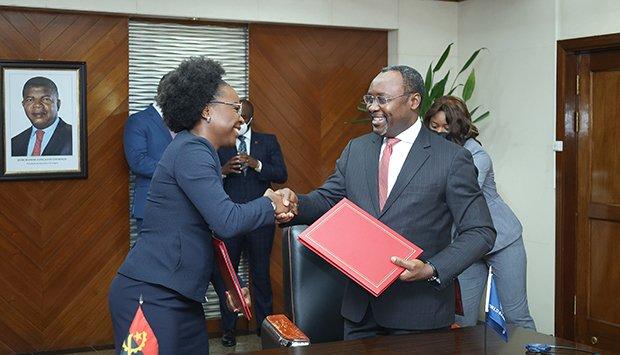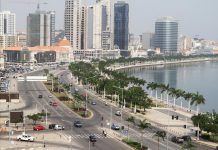Africa-Press – Angola. The Minister of Finance, Vera Daves, and the regional director of the World Bank for Angola, Burundi, the Democratic Republic of Congo and São Tomé and Príncipe, Albert Zeufack, signed, Thursday (6), in Luanda, two financing agreements evaluated at 510 million dollars, one of which to improve the conditions of access to water for almost one million Angolans.
The first of the agreements is related to the Climate Resilience and Water Security project (Reclima), of the Ministry of Energy and Water, financed in 450 million dollars, 300 million contracted with the World Bank and 150 million from the French Development Agency (AFD). ).
The second is the Statistical Capacity Strengthening Project, worth US$60 million, with the National Statistics Institute (INE) as beneficiary.
The two loans were negotiated on concessional terms (low interest rates and long repayment terms), with the Statistical Capacity Strengthening Project being granted for a period of 19 years and a five-year grace period.
The minister highlighted the importance of Reclima for its potential to benefit 955,000 people in terms of water supply and water security in rural and urban areas, with 550 increasing their resilience to drought, the impact of climate change and supply, as well as 78,000 obtain reliable sources of drinking water.
Reclima, said Vera Daves, will allow the implementation of water points in rural areas for the benefit of 310,000 people, as well as providing access to reliable water for consumption, fishing, agriculture and livestock to 19,250 poor people, including the reconstruction of the Sendi Dam, in Huíla Province.
The Statistical Capacity Strengthening Project is carried out over a period of five years and is dedicated to carrying out institutional reform and strengthening the capacity of the National Statistical System, providing for three components.
This includes the modernization of administrative records, increased production and dissemination of official country statistics with diverse economic information, as well as regular monitoring of the well-being of populations for the formulation of public policies. It also advocates a monitoring system for agriculture and fisheries.
The preparation of the next General Population Census (GPC) is among the main issues that the financing agreements are intended to solve.
“With this project, we will have a more active INE in terms of institutional, technical and operational capacity”, said Vera Daves, indicating that the institutional supervision of this program is assigned to the Ministry of Economy and Planning.
The agreements, considered Vera Daves, represent “a reaffirmation” of the Government’s commitment “to Angolan society” and of a “programme of structural reforms and continuous improvement of public services for families, companies and the population in general”.
The Secretary of State for the Economy, Ivan dos Santos, promised, when speaking at the signing of the agreements, the rigorous use of funds, which will guarantee the increase of institutional capacity and reliable data.
USD 2 billion
After signing the agreements, the regional director of the World Bank recalled that Reclima is an extension of previous programs, namely, the Water Sector Institutional Development Project (PDISA-1 and 2), programs that he said had contributed to the improvement of the supply over a decade.
Albert Zeufack underlined that, with Reclima, the World Bank allocates US$1 billion to the Angolan water sector, in addition to the US$1 billion used to strengthen the Águas do Bita project, in Luanda.
On the other hand, the project will aim to support water and sanitation companies in several provinces. Albert Zeufack also highlighted the contribution of these programs to the strengthening of the essential bases of the National Water Directorate, the National Institute of Water Resources and the Energy Regulatory Institute.
Regarding the strengthening of statistical capacity, Albert Zeufack said it was the extension of a project that began in 2017, allowing Angola to cover gaps inherent in the data base.
This program will improve the monitoring of Angola’s social and economic indicators, insisted the World Bank representative, expressing expectations that, with materialization, Angola will be able to modernize its statistical services.
The World Bank, according to Albert Zeufack, will also contribute to a survey related to well-being in municipalities, in 2023, in preparation for the 2024 Population Census, he announced.
Project results
The Minister of Energy and Water, João Baptista Borges, who participated in the signing ceremony, highlighted that the PDISA-1 and 2 projects have been successfully implemented and with good results in the target locations.
The reinforcement of the credit guarantee signed with the World Bank will also allow the continuity of the Águas do Bita project, which he said is a priority program of the Government.
As for the Reclima project, João Baptista Borges informed that it will involve three coastal provinces, as it is a Water Resilience project that complements the efforts that the Government has already developed to increase the availability of water and sanitation in these regions, with emphasis on , in the south of Angola, subject to the effects of long droughts and where the Campaign to Combat Drought is carried out, in the provinces of Cunene, Huíla and Namibe.
“We are moving towards fulfilling the objectives of Sustainable Development, not forgetting that the availability of water is one of the guarantees that each Government must give to its populations”, stressed the minister.
For More News And Analysis About Angola Follow Africa-Press






![Africa Forges a Trade Future Beyond AGOA [Business Africa] Africa Forges a Trade Future Beyond AGOA [Business Africa]](https://static.africa-press.net/angola/sites/65/2026/02/sm_1771529054.751191-218x150.jpg)